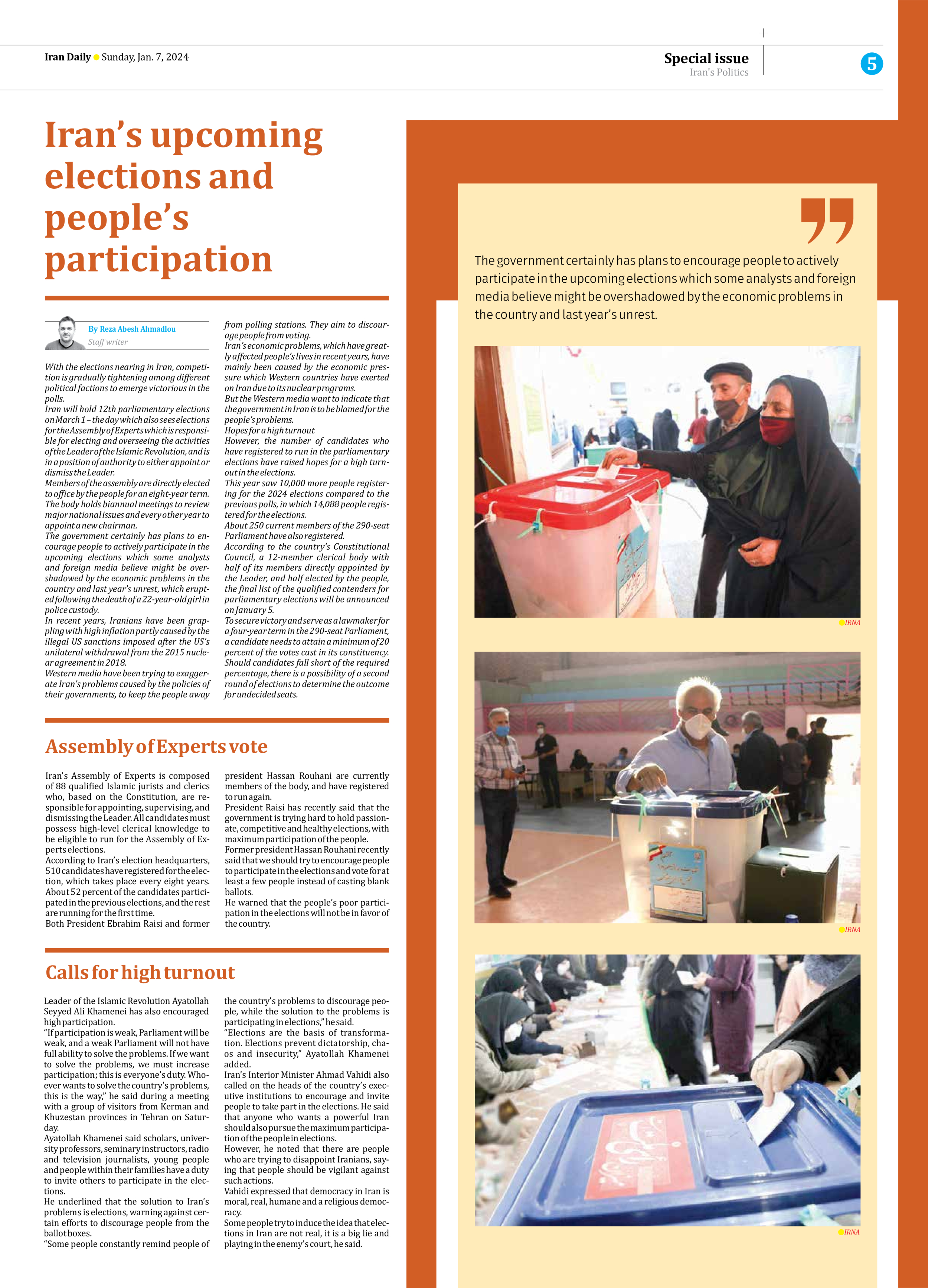
Iran’s upcoming elections and people’s participation
By Reza Abesh Ahmadlou
Staff writer
With the elections nearing in Iran, competition is gradually tightening among different political factions to emerge victorious in the polls.
Iran will hold 12th parliamentary elections on March 1 – the day which also sees elections for the Assembly of Experts which is responsible for electing and overseeing the activities of the Leader of the Islamic Revolution, and is in a position of authority to either appoint or dismiss the Leader.
Members of the assembly are directly elected to office by the people for an eight-year term. The body holds biannual meetings to review major national issues and every other year to appoint a new chairman.
The government certainly has plans to encourage people to actively participate in the upcoming elections which some analysts and foreign media believe might be overshadowed by the economic problems in the country and last year’s unrest, which erupted following the death of a 22-year-old girl in police custody.
In recent years, Iranians have been grappling with high inflation partly caused by the illegal US sanctions imposed after the US’s unilateral withdrawal from the 2015 nuclear agreement in 2018.
Western media have been trying to exaggerate Iran’s problems caused by the policies of their governments, to keep the people away from polling stations. They aim to discourage people from voting.
Iran’s economic problems, which have greatly affected people’s lives in recent years, have mainly been caused by the economic pressure which Western countries have exerted on Iran due to its nuclear programs.
But the Western media want to indicate that the government in Iran is to be blamed for the people’s problems.
Hopes for a high turnout
However, the number of candidates who have registered to run in the parliamentary elections have raised hopes for a high turnout in the elections.
This year saw 10,000 more people registering for the 2024 elections compared to the previous polls, in which 14,088 people registered for the elections.
About 250 current members of the 290-seat Parliament have also registered.
According to the country’s Constitutional Council, a 12-member clerical body with half of its members directly appointed by the Leader, and half elected by the people, the final list of the qualified contenders for parliamentary elections will be announced on January 5.
To secure victory and serve as a lawmaker for a four-year term in the 290-seat Parliament, a candidate needs to attain a minimum of 20 percent of the votes cast in its constituency. Should candidates fall short of the required percentage, there is a possibility of a second round of elections to determine the outcome for undecided seats.
Assembly of Experts vote
Iran’s Assembly of Experts is composed of 88 qualified Islamic jurists and clerics who, based on the Constitution, are responsible for appointing, supervising, and dismissing the Leader. All candidates must possess high-level clerical knowledge to be eligible to run for the Assembly of Experts elections.
According to Iran’s election headquarters, 510 candidates have registered for the election, which takes place every eight years. About 52 percent of the candidates participated in the previous elections, and the rest are running for the first time.
Both President Ebrahim Raisi and former president Hassan Rouhani are currently members of the body, and have registered to run again.
President Raisi has recently said that the government is trying hard to hold passionate, competitive and healthy elections, with maximum participation of the people.
Former president Hassan Rouhani recently said that we should try to encourage people to participate in the elections and vote for at least a few people instead of casting blank ballots.
He warned that the people’s poor participation in the elections will not be in favor of the country.
Calls for high turnout
Leader of the Islamic Revolution Ayatollah Seyyed Ali Khamenei has also encouraged high participation.
“If participation is weak, Parliament will be weak, and a weak Parliament will not have full ability to solve the problems. If we want to solve the problems, we must increase participation; this is everyone’s duty. Whoever wants to solve the country’s problems, this is the way,” he said during a meeting with a group of visitors from Kerman and Khuzestan provinces in Tehran on Saturday.
Ayatollah Khamenei said scholars, university professors, seminary instructors, radio and television journalists, young people and people within their families have a duty to invite others to participate in the elections.
He underlined that the solution to Iran’s problems is elections, warning against certain efforts to discourage people from the ballot boxes.
“Some people constantly remind people of the country’s problems to discourage people, while the solution to the problems is participating in elections,” he said.
“Elections are the basis of transformation. Elections prevent dictatorship, chaos and insecurity,” Ayatollah Khamenei added.
Iran’s Interior Minister Ahmad Vahidi also called on the heads of the country’s executive institutions to encourage and invite people to take part in the elections. He said that anyone who wants a powerful Iran should also pursue the maximum participation of the people in elections.
However, he noted that there are people who are trying to disappoint Iranians, saying that people should be vigilant against such actions.
Vahidi expressed that democracy in Iran is moral, real, humane and a religious democracy.
Some people try to induce the idea that elections in Iran are not real, it is a big lie and playing in the enemy’s court, he said.







